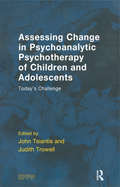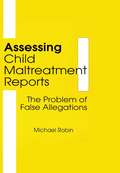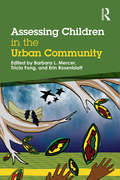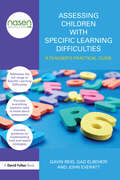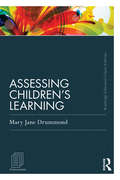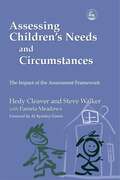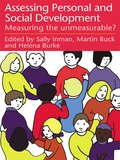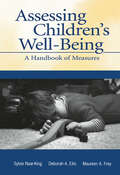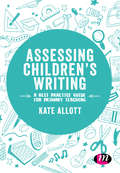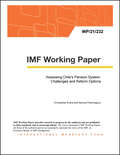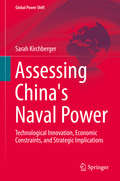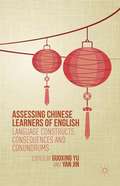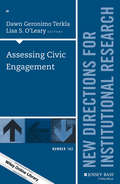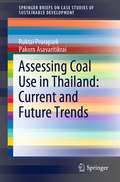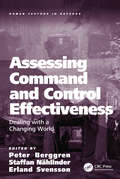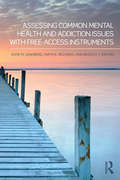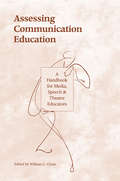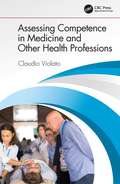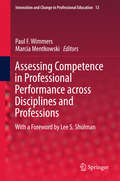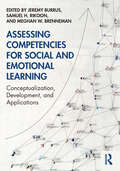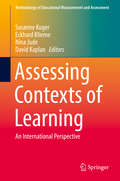- Table View
- List View
Assessing Change in Psychoanalytic Psychotherapy of Children and Adolescents: Today's Challenge (The\efpp Monograph Ser.)
by John Tsiantis Judith TrowellThis book draws together work from across Europe by leading clinical researchers who have been looking into the effectiveness of psychoanalytic interventions. They are mostly time limited, brief, non-intensive ways of working so are applicable in many settings and can therefore be generalised to other clinical teams. The populations worked with are diverse and often present mainstream services with refractory clinical problems, so an applied psychoanalytic approach is well worth trying, given the evidence presented in this volume. There is in addition an excellent theoretical chapter on the issues of such clinical research from Stephen Shirk which merits consideration by those wishing to evaluate their own work. This book is an important contribution to services for child and adolescent mental health. With increasing family distress and concerns about inadequate parenting, family breakdown and troublesome adolescents, it will help to ensure the full menu of interventions is retained in these times of financial restraint.
Assessing Child Maltreatment Reports: The Problem of False Allegations
by Jerome Beker Michael RobinThis seminal book in the literature of child protective services stimulates critical thinking and informed discussion for those professionals and educators concerned with the quality of children’s protective services. The first book of its kind to present scholarly reports on false allegations, Assessing Child Maltreatment Reports tackles the age-old problem of deciding which reports, verbal or written, represent truth and which represent falsehood. When one deals with accusations in the area of child maltreatment, special problems are posed. This vital resource brings home the complexity and seriousness of confronting the need to separate true reports from false reports. Given the serious consequences of reports of maltreatment, determining the accuracy or inaccuracy of such reports is of major critical importance to all concerned and the parents, children, and professionals directly involved. This book deals effectively and practically with the everyday work of assessing the validity and reliability of maltreatment reports and guides professionals through rough waters of finding truth with helpful research.This courageous book provides hope for establishing a deeper understanding of the broad system of child protection and consequently, enables professionals to better handle individual crises and cases. Containing a range of chapters--authored by leading academic researchers and practitioners in child welfare services in the United States--which examine the policy and practice issues related to false allegations of child abuse and neglect, this volume provides guideposts for further research and discussion. College and university students in child welfare and related programs, human service practitioners working in child protective and welfare services, and the larger public--both parents and professionals working with children--who have an interest in this important issue, will find Assessing Child Maltreatment Reports a compassionate approach to a sensitive issue.
Assessing Children in the Urban Community
by Barbara L Mercer Tricia Fong Erin RosenblattThis book illuminates the process of child psychological assessment in community psychology through discussion, theory, and case studies of collaborative, systemic treatment of children and their parents. "Assessing Children in the Urban Community" presents a semi-structured form of collaborative psychological assessment, designed to help clients gain new insights and make changes in their lives. Traditional psychological assessment focuses on diagnosis and treatment but has been slow to include contextual elements, particularly social and cultural contexts into the assessment process and psychological report. Clients receiving services in a community psychology clinic pay for their treatment through state welfare coverage. They cannot choose their providers, they cannot always determine the length and course of their mental health care, they often do not have access to transportation to begin services, to continue them, or to take advantage of follow-up recommendations. The Therapeutic Assessment model is particularly adaptable to community psychology because it allows maximum interaction in the assessment process and promotes participation and collaboration in an often dis-empowering system. This book will be relevant to clinical psychologists, community psychologists, social workers, family therapists, graduate students in psychology, social work, marriage and family therapists, and counseling programs.
Assessing Children with Specific Learning Difficulties: A teacher's practical guide (nasen spotlight)
by Gavin Reid John Everatt Gad ElbeheriThis comprehensive book provides all the information that practitioners need to know about assessment in relation to their pupils with Specific Learning Difficulties. The why, how and what of assessment is addressed, whilst the link between assessment and intervention is also a key focus. Looking at the full range of Specific Learning Difficulties, this book provides practical guidance on implementing strategies that are tried and tested for use in any classroom, whilst also acknowledging that assessment is a process involving other professionals and parents. Addressing issues and topics common in inclusive classrooms around the world, key topics covered include: Specific Learning Difficulties in context Teacher Assessment in literacy, numeracy and movement Motor development and co-ordination Attention factors in learning The key issues on learning differences Self-esteem and emotional literacy How to enhance skills and the self-sufficiency of teachers Assessing Children with Specific Learning Difficulties will be an invaluable guide for classroom teachers, learning support departments, psychologists and other professionals.
Assessing Children's Learning (Primary Curriculum Ser.)
by Mary Jane Drummond"It is my sincere wish that the teachers of those thousands of children, who increasingly are also teacher educators, read and learn from Assessing Children‘s Learning. The hope is that they will go on to make a reality of theimaginary but not impossible classroom and make moral judgements and choices in the best interests of children." - Sue Sw
Assessing Children's Needs and Circumstances: The Impact of the Assessment Framework
by Hedy Cleaver Steve Walker Al Aynsley-GreenDrawing on in-depth interviews with social workers and their managers, and families and young people themselves, the authors of this important book show how the principles embodied in the Assessment Framework have been applied to social work practice. Revisiting the principles outlined in the legislative context and the Assessment Framework, they show how the focus on assessment has affected the work with children, and the experiences of children and families themselves. The authors identify a range of issues that influence the implementation of the Assessment Framework, including the key areas where support and training are needed. They review social workers' and other professionals' appraisal of how the Assessment Framework affects individual practice and inter-agency collaboration, as well as exploring how satisfied young people and their parents are with the assessments they are involved in. Finally, they examine the cost to social services of undertaking a core assessment. Emphasising the importance of a joined-up child care service, the authors' findings have been taken into account in the development of the Integrated Children's System. This book should be read by all those professionals who are working to promote the welfare and well-being of children.
Assessing Children's Personal And Social Development: Measuring The Unmeasurable?
by Sally Inman Martin Buck Helena BurkeSocial and personal development of pupils is an area of growing interest. However, while much has been done in relation to provision for development, there is little available on how teachers might assess the development of pupils, be it spiritual, moral, social or cultural. The contributors also examine how we might accredit such development. With provision for development on the national agenda, this title looks at the repercussions and examines the difficult issues raised by assessment and accreditation - and the problems with which teachers will inevitably be faced.
Assessing Children's Well-Being: A Handbook of Measures
by Sylvie Naar-King Deborah A. Ellis Maureen A. Frey Michele Lee OndersmaBehavioral medicine has now matured as a field to the point where all recognize that different populations are presented with different issues. Psychological reactions and patterns affect the health and well-being of children, as well as adults, and numerous standardized instruments for the assessment of a variety of areas of children's functioning are currently available. Yet, it can be difficult for practitioners and researchers searching through general compendia of resources for child assessment--which are frequently focused on general techniques rather than specific instruments--to identify the optimal ones to meet their particular needs and to choose among them.This practical and comprehensive reference guide is the first to sort, present, and review all the measures that can be used to evaluate the behavioral, cognitive, and emotional aspects of children's health. It organizes the measures under eight general headings, such as quality of life, adherence, pain management, and patient satisfaction. Each chapter begins with a leading authority's overview of the underlying theoretical construct and any concerns about how to measure it. Descriptions and reviews of relevant instruments follow; these include information on administration, scoring, psychometric properties, and ordering, as well as comments by the instruments' developers.Assessing Children's Well-Being: A Handbook of Measures will be welcomed by all those professionals and scientists who seek to assess and effectively address the complex interactions between physical health and mental health in children.
Assessing Children's Writing: A best practice guide for primary teaching (Exploring the Primary Curriculum)
by Kate AllottThis book supports teachers and trainee teachers with the assessment of writing, and particularly assessment as part of the cycle of planning and teaching – assessment used formatively. - Explores the issues and challenges in the assessment of writing - Highlights the importance of specific feedback - Features examples of children's work and detailed guidance on how to assess each piece - Includes a chapter on supporting children to write more outside of school
Assessing Children's Writing: A best practice guide for primary teaching (Exploring the Primary Curriculum)
by Kate AllottThis book supports teachers and trainee teachers with the assessment of writing, and particularly assessment as part of the cycle of planning and teaching – assessment used formatively. - Explores the issues and challenges in the assessment of writing - Highlights the importance of specific feedback - Features examples of children's work and detailed guidance on how to assess each piece - Includes a chapter on supporting children to write more outside of school
Assessing Chile’s Pension System: Challenges and Reform Options (Imf Working Papers)
by Christopher Evans and Samuel PienknaguraA report from the International Monetary Fund.
Assessing China's Naval Power: Technological Innovation, Economic Constraints, and Strategic Implications (Global Power Shift)
by Sarah KirchbergerThis book analyzes the rise of China's naval power and its possible strategic consequences from a wide variety of perspectives - technological, economic, and geostrategic - while employing a historical-comparative approach throughout. Since naval development requires huge financial resources and mostly takes place within the context of transnational industrial partnerships, this study also consciously adopts an industry perspective. The systemic problems involved in warship production and the associated material, financial, technological, and political requirements currently remain overlooked aspects in the case of China. Drawing on first-hand working experience in the naval shipbuilding industry, the author provides transparent criteria for the evaluation of different naval technologies' strategic value, which other researchers can draw upon as a basis for further research in such diverse fields as International Security Studies, Naval Warfare Studies, Chinese Studies, and International Relations.
Assessing Chinese Learners of English: Language Constructs, Consequences And Conundrums
by Guoxing YuThis volume gathers researchers from around the world endeavouring to better understand a number of perennial issues in assessing Chinese learners of English, covering topics such as students' test performances, interactional competence and lexical knowledge, students' motivation, teachers' attitudes and assessment policy changes.
Assessing Civic Engagement: New Directions for Institutional Research, Number 162 (J-B IR Single Issue Institutional Research)
by Dawn Geronimo Terkla Lisa S. O'LearyHow does one assess community service, civic engagement, and the impact of service learning on a college campus? This volume reviews contemporary research, measurement instruments, and practices in the assessment of civic engagement in higher education, including: meta-analyses of students, faculty, institutions, and higher education systems at-large, targeted case studies of campus-specific practices at individual institutions, efficient and effective ways to gauge the influence of civic engagement on higher education policy, practices, and outcomes, and quantitative and qualitative approaches to measuring the effort, importance of, and impact of students’ and institutions’ involvement in community service, community engagement, civic engagement, and service learning on a college campus. The research ranges between decisions made either as part of institutional agendas, curricular enhancements, or student life initiatives and student and professor involvement in civic engagement activities and supportive attitudes. This is the 162nd volume of this Jossey-Bass quarterly report series. Timely and comprehensive, New Directions for Institutional Research provides planners and administrators in all types of academic institutions with guidelines in such areas as resource coordination, information analysis, program evaluation, and institutional management.
Assessing Climate Change Vulnerability at Airports: A Primer
by National Academies of Sciences, Engineering, and Medicine Transportation Research Board Airport Cooperative Research Program Rs H Cascadia Consulting Group Gresham Smith IcfFuture weather events at airports will likely look different from what is experienced today because of a changing climate. ACRP Web-Only Document 64: Assessing Climate Change Vulnerability at Airports: A Primer, from TRB's Airport Cooperative Research Program, is intended for use by airport decisionmakers, operators, planners, and consultants interested in assessing the vulnerability of airports to the impacts of climate change. The document updates ACRP Report 147: Climate Change Adaptation Planning: Risk Assessment for Airports and ACRP Report 160: Addressing Significant Weather Impacts on Airports: Quick Start Guide and Toolkit.
Assessing Coal Use in Thailand: Current and Future Trends (SpringerBriefs on Case Studies of Sustainable Development)
by Ruktai Prurapark Pakorn AsavaritikraiThis book highlights Thailand’s growing demand for clean energy from coal. The main source of energy for electricity production in Thailand (70%) is currently natural gas. However, natural gas extraction remains limited, resulting in an increasing need to import natural gas from other countries, which in turn leads to rising prices and unstable supplies. As such, coal energy is essential for industrial use and electricity production in Thailand. The book discusses the importance of developing and implementing clean technologies for coal. It also argues that collaborations between the government, private sector and the public are vital to achieving a mutual understanding and acceptance of coal energy and clean technologies, as well as a reduction in harmful emissions.
Assessing Command and Control Effectiveness: Dealing with a Changing World (Human Factors in Defence)
by Peter Berggren Staffan Nählinder Erland SvenssonAssessing Command and Control Effectiveness: Dealing with a Changing World offers a description of the current state of Command and Control (C2) research in imperfect settings, showing how a research process should assess, analyse and communicate results to the development cycle of methods, work, manning and C2-technology. Special attention is given to the development of C2 research methods to meet the current and coming needs. The authors also look forward towards a future where effective assessment of C2 abilities are even more crucial, for instance in agile organisations. The purpose of the C2 research is to improve the process and make it more effective while still saving time and money. Research methods have to be chosen carefully to be effective and simple, yet provide results of high quality. The methodological concerns are a major consideration when working under such circumstances. Furthermore, there is often a need for a swift iterative development cycle, and thus a demand to quickly deliver results from the research process. This book explains how field research experimentation can be quick, simple and effective, being able to draw valid conclusions even when sample sizes are small and resources are limited, collecting empirical data using measures and procedures that are minimally intrusive.
Assessing Common Mental Health and Addiction Issues With Free-Access Instruments
by Bradley T. Erford Katie M. Sandberg Taryn E. RichardsAs healthcare costs rise, so too do the costs of assessment instruments, critical tools for mental health professionals. While some traditional assessment instruments have become prohibitively expensive, as with many other fields, the Internet offers a host of more affordable and equitable alternative assessment tools at little or no cost. The pitfall of this alternative, thus far, has been the lack of vetting and quality assessment. Assessing Common Mental Health and Addiction Issues With Free-Access Instruments fills this gap by providing the first analysis and assessment of these tools, provided by some of the leading names in mental health assessment instruments. This resource identifies the most efficient free access instruments and provides summary information about administration, scoring, interpretation, psychometric integrity, and strengths and weaknesses. The book is organized around the most common broad range issues encountered by helping professionals, and whenever possible, a link to the instrument itself is provided. This is an essential text for all mental health professionals looking to expand the scope and range of their assessment instruments.
Assessing Communication Education: A Handbook for Media, Speech, and Theatre Educators (Routledge Communication Series)
by William G. ChristDesigned as a handbook, this text provides media, speech (public speaking, interpersonal, small group, and organizational communication), and theatre educators with both the theoretical and practical ammunition to fight the assessment battles on their campuses. The philosophical implications of accountability are balanced with concrete, specific, and usable assessment strategies. Stressing student, faculty, course, program, department, and institutional assessment, this book's aim is to provide, in one place, information that will help diverse and complex communication programs face the growing challenges in assessment. The book is divided into three sections: background and foundational information for assessment; broad assessment strategies that apply to a variety of media, "speech," and theatre courses and programs; and context-specific assessment strategies. While covering a host of topics, it: * provides an overview of assessment and suggests how it might impact communication education, * discusses the elements of program assessment and how linkage of mission statements with outcomes can lead to strong, innovative programs, * compares and contrasts regional association requirements and presents a specific how-to strategy for writing outcome statements, * discusses teaching evaluation and argues that we need to identify the "what" of teaching before we try to measure the "how," * looks at creative ways for formative and summative course evaluation that starts with the creation of an explicit syllabus, * discusses the use of capstone courses as a way of evaluating not only their major but also how students have integrated their "total" educational experience, * suggests the variety of ways that interpersonal communication can be assessed and calls for future research that stresses the "knowledge" component of learning, * reports on a strategy for developing small group communication assessment measures, and * provides media, speech, and theatre faculty and administrators with the background, understanding and tools to build stonger programs and develop better courses and educational experiences for their students.
Assessing Competence in Medicine and Other Health Professions
by Claudio ViolatoThis comprehensive, yet accessible, text demystifies the challenging area of competence assessement in medicine and the health sciences, providing a clear framework and the tools for anyone working or studying in this area. Written by a single, highly experienced, author, the content benefits from uniformity of style and is supported and enhanced by a range of pedagogic features including cases, questions and summaries. Essential reading for all students and practitioners of medical education, it will also be an invaluable guide for allied health professionals and psychologists with a general interest in assessment, evaluation and measurement and a useful library reference.
Assessing Competence in Professional Performance across Disciplines and Professions (Innovation and Change in Professional Education #13)
by Paul F. Wimmers Marcia MentkowskiThis book examines the challenges of cross-professional comparisons and proposes new forms of performance assessment to be used in professions education. It addresses how complex issues are learned and assessed across and within different disciplines and professions in order to move the process of "performance assessment for learning" to the next level. In order to be better equipped to cope with increasing complexity, change and diversity in professional education and performance assessment, administrators and educators will engage in crucial systems thinking. The main question discussed by the book is how the required competence in the performance of students can be assessed during their professional education at both undergraduate and graduate levels. To answer this question, the book identifies unresolved issues and clarifies conceptual elements for performance assessment. It reviews the development of constructs that cross disciplines and professions such as critical thinking, clinical reasoning, and problem solving. It discusses what it means to instruct and assess students within their own domain of study and across various roles in multiple contexts, but also what it means to instruct and assess students across domains of study in order to judge integration and transfer of learning outcomes. Finally, the book examines what it takes for administrators and educators to develop competence in assessment, such as reliably judging student work in relation to criteria from multiple sources. ". . . the co-editors of this volume, Marcia Mentkowski and Paul F. Wimmers, are associated with two institutions whose characters are so intimately associated with the insight that assessment must be integrated with curriculum and instructional program if it is to become a powerful influence on the educational process . . . " Lee Shulman, Stanford University
Assessing Competencies for Social and Emotional Learning: Conceptualization, Development, and Applications
by Jeremy Burrus Samuel H. Rikoon Meghan W. BrennemanAssessing Competencies for Social and Emotional Learning explores the conceptualization, development, and application of assessments of competencies and contextual factors related to social and emotional learning (SEL). As programs designed to teach students social and emotional competencies are being adopted at an ever‐increasing rate, new measurements are needed to understand their impact on student attitudes, behaviors, and academic performance. This book integrates standards of fairness, reliability, and validity, and lessons learned from personality and attitude assessment to facilitate the principled development and use of SEL assessments. Education professionals, assessment developers, and researchers will be better prepared to systematically develop and evaluate measures of social and emotional competencies.
Assessing Competitiveness After Conflict: The Case of the Central African Republic
by Said Bakhache Mark Lewis Kadima Kalonji Jean-Claude NachegaA report from the International Monetary Fund.
Assessing Competitiveness and Real Exchange Rate Misalignment in Low-Income Countries
by Gabriel Di Bella Mark Lewis Aurélie MartinA report from the International Monetary Fund.
Assessing Contexts of Learning: An International Perspective (Methodology of Educational Measurement and Assessment)
by David Kaplan Susanne Kuger Eckhard Klieme Nina JudeThis volume brings together educational effectiveness research and international large-scale assessments, demonstrating how the two fields can be applied to inspire and improve each other, and providing readers direct links to instruments that cover a broad range of topics and have been shown to work in more than 70 countries. The book's initial chapters introduce and summarize recent discussions and developments in the conceptualization, implementation, and evaluation of international large-scale context assessments and provide an outlook on possible future developments. Subsequently, three thematic sections - "Student Background", "Outcomes of Education Beyond Achievement", and "Learning in Schools" - each present a series of chapters that provide the conceptual background for a wide range of important topics in education research, policy, and practice. Each chapter defines a conceptual framework that relates recent findings in the educational effectiveness research literature to current issues in education policy and practice. These frameworks were used to develop interesting and relevant indicators that may be used for meaningful reporting from international assessments, other cross-cultural research, or national studies. Using the example of one particular survey (the Programme for International Student Assessment (PISA 2015)), this volume links all theoretical considerations to fully developed questionnaire material that was field trailed and evaluated in questionnaires for students and their parents as well as teachers and principals in their schools. The primary purposes of this book are to inform readers about how education effectiveness research and international large-scale assessments are already interacting to inform research and policymaking; to identify areas where a closer collaboration of both fields or input from other areas could further improve this work; to provide sound theoretical frameworks for future work in both fields; and finally to relate these theoretical debates to currently available and evaluated material for future context assessments.
